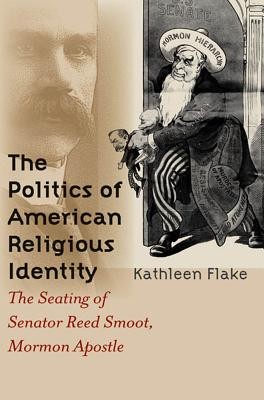
- We will send in 10–14 business days.
- Author: Kathleen Flake
- Publisher: University of North Carolina Press
- ISBN-10: 0807855014
- ISBN-13: 9780807855010
- Format: 16.3 x 23.4 x 1.5 cm, softcover
- Language: English
- SAVE -10% with code: EXTRA
Reviews
Description
Between 1901 and 1907, a broad coalition of Protestant churches sought to expel newly elected Reed Smoot from the Senate, arguing that as an apostle in the Church of Jesus Christ of Latter-day Saints, Smoot was a lawbreaker and therefore unfit to be a lawmaker. The resulting Senate investigative hearing featured testimony on every peculiarity of Mormonism, especially its polygamous family structure. The Smoot hearing ultimately mediated a compromise between Progressive Era Protestantism and Mormonism and resolved the nation's long-standing "Mormon Problem." On a broader scale, Kathleen Flake shows how this landmark hearing provided the occasion for the country--through its elected representatives, the daily press, citizen petitions, and social reform activism--to reconsider the scope of religious free exercise in the new century.
Flake contends that the Smoot hearing was the forge in which the Latter-day Saints, the Protestants, and the Senate hammered out a model for church-state relations, shaping for a new generation of non-Protestant and non-Christian Americans what it meant to be free and religious. In addition, she discusses the Latter-day Saints' use of narrative and collective memory to retain their religious identity even as they changed to meet the nation's demands.
EXTRA 10 % discount with code: EXTRA
The promotion ends in 17d.12:06:15
The discount code is valid when purchasing from 10 €. Discounts do not stack.
- Author: Kathleen Flake
- Publisher: University of North Carolina Press
- ISBN-10: 0807855014
- ISBN-13: 9780807855010
- Format: 16.3 x 23.4 x 1.5 cm, softcover
- Language: English English
Between 1901 and 1907, a broad coalition of Protestant churches sought to expel newly elected Reed Smoot from the Senate, arguing that as an apostle in the Church of Jesus Christ of Latter-day Saints, Smoot was a lawbreaker and therefore unfit to be a lawmaker. The resulting Senate investigative hearing featured testimony on every peculiarity of Mormonism, especially its polygamous family structure. The Smoot hearing ultimately mediated a compromise between Progressive Era Protestantism and Mormonism and resolved the nation's long-standing "Mormon Problem." On a broader scale, Kathleen Flake shows how this landmark hearing provided the occasion for the country--through its elected representatives, the daily press, citizen petitions, and social reform activism--to reconsider the scope of religious free exercise in the new century.
Flake contends that the Smoot hearing was the forge in which the Latter-day Saints, the Protestants, and the Senate hammered out a model for church-state relations, shaping for a new generation of non-Protestant and non-Christian Americans what it meant to be free and religious. In addition, she discusses the Latter-day Saints' use of narrative and collective memory to retain their religious identity even as they changed to meet the nation's demands.


Reviews